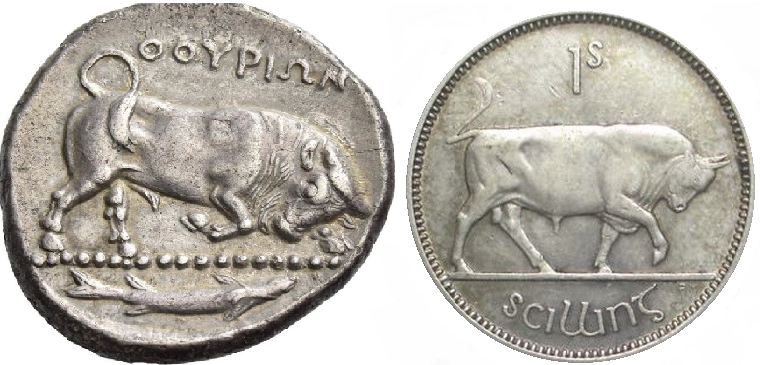
CLIC is an ERC-funded project investigating the sustained diachronic relevance of classical material from ancient Greece and Rome to the formation of socio-political Irish identities from the medieval period to the present day. The project will be launched at AIAS on 1 October 2019 and will be hosted by the Centre for Irish Studies at AU’s Department of English, running until 2024.
The launch event is free and open to the public but registration is required for catering purposes. Please register by 26 September 2019.
16:00-16:05: Welcome by Dominic Rainsford (Aarhus University)
16:05-16:25: Classical Influences and Irish Culture: An ERC Project, Isabelle Torrance (Aarhus University)
16:25-16:40: Reflections: Literary Perspectives from Barry McCrea, University of Notre Dame (introduced by Mads Rosendahl Thomsen, Aarhus University)
16:40-16:55: Reflections: Historical Perspectives from Ian McBride, University of Oxford (introduced by Sara Dybris McQuaid, Aarhus University)
16:55-17:00: Concluding remarks, Isabelle Torrance (Aarhus University)
17:00-18:00: Drinks and discussion in AIAS Hall
Special Guests
Ian McBride is Foster Professor of Irish History at Oxford University and Fellow of Hertford College. He has broad interests in Ireland between the seventeenth and twenty-first centuries, especially its politics, culture and intellectual life. His books include The Siege of Derry in Ulster Protestant Mythology (1997) and Scripture Politics: Ulster Presbyterians and Irish Radicalism in the Late Eighteenth Century (1998), both short-listed for the Christopher Ewart-Biggs Literary Prize; and Eighteenth-Century Ireland: The Isle of Slaves (2009). Additionally he has co-edited The Princeton History of Modern Ireland (2016), with Richard Bourke, and is completing Irish Political Writings I for the new Cambridge Edition of the Works of Jonathan Swift.
Barry McCrea is Donald R. Keough Family Professor of Irish Studies and Professor of English, Irish Language and Literature, and Romance Languages and Literatures. He is an award-winning scholar and novelist. As well as numerous articles and essays about modern Irish and European literature, he is the author of The First Verse, a novel, which won the 2006 Ferro-Grumley prize for fiction, and In the Company of Strangers: Family and Narrative in Dickens, Conan Doyle, Joyce and Proust (Columbia University Press, 2011), which won the Yale Heyman Prize for scholarship in the humanities. His most recent book, Languages of the Night: Minor Languages and the Literary Imagination in Twentieth-Century Ireland and Europe (Yale University Press, 2015) was awarded the 2016 René Wellek ("best book") Prize by the American Comparative Literature Association. Formerly a Professor at Yale he has held numerous prestigious fellowships including, most recently, the Faber Fellowship in Comparative Literature at Princeton.
Welcome
Dominic Rainsford is Head of Department and Professor of Literature in English at Aarhus University. He has published widely on literature and ethics, Charles Dickens, William Blake, James Joyce, the English Channel, French literature, modern American poetry, Russian film, and land art. The second edition of his book for students, Studying Literature in English (Routledge, 2014), is due next year. He is President of the Danish Association of English Studies and, with effect from 2020, General Editor of the Dickens Quarterly.
Project Presentation
Isabelle Torrance is Director of the ERC-funded project Classical Influences and Irish Culture (2019-2024). She has published six books and numerous articles on classical literature and its reception. Forthcoming books include Classics and Irish Politics: 1916-2016, co-edited with Donncha O’Rourke (OUP), and Greek Tragedy and Irish Politics (in progress).
Introductions
Mads Rosendahl Thomsen is Professor of Comparative Literature at Aarhus University. He has published seventeen books, including monographs and edited volumes in English and in Danish, along with numerous articles in the fields of literary historiography, modernist literature, world literature, canonization, and historical representations of the posthuman. He has taught at Harvard’s Institute for World Literature, where he serves on the advisory board, while he also directs the Digital Arts Initiative and Human Futures research programmes at AU. He is a member of Academia Europaea and of the executive committee of the International Comparative Literature Association.
Sara Dybris McQuaid is Associate Professor in British and Irish History and Director of the Centre for Irish Studies at Aarhus University, as well as a research partner at the Centre for Resolution of International Conflicts, Department of Political Science, Copenhagen University. Recent publications include Ireland and the North (Peter Lang, 2019; co-edited with Fionna Barber and Heidi Hansson) and Administrations of Memory: Transcending the Nation and Bringing back the State (special issue of The International Journal of Politics, Culture and Society, 2019; co-edited with S. Gensburger).
Project title: Classical Influences and Irish Culture (CLIC)
Ireland’s complex (post)colonial history has been highly visible recently, owing to the difficulties regarding the Irish border that have arisen in connection with Brexit, even as the Republic of Ireland commemorates 100 years since its struggle for independence. This project will analyse Irish political history through a new lens, demonstrating how models from Greece and Rome have repeatedly served as a conduit for political expression in Irish culture. Ireland’s vibrant tradition of classical learning dates back to its earliest recorded literature, and is unique among postcolonial nations. This project will shed new light on the role of classical influences in shaping Irish discourses of language politics, of warfare, of migration, of political satire, of non-sectarian philosophy, of gender, and of material culture, with case studies ranging from the medieval period to the present day. Moreover, the global impact of Irish classicism on postcolonial literature from Latin America, the Middle East and the Maghreb will highlight the broader international relevance of classical reception in Ireland.
Project period: 2019-2024
Funded by: the European Research Council (ERC) and the Consolidator grant.